NATURAL POPULARITY
A vlogger and author is using entertainment to entice public interest in science's wild side, Yang Feiyue reports.

Suspenseful music gets audiences' adrenaline pumping, as snowcapped mountains leap into sight, immediately pulling viewers into the documentary, The Forest of Metog — The Beautiful Creatures in the World's Largest Canyon.
These glaciers, the vast grasslands and arid plateau terrain may account for many people's first impressions of the Xizang autonomous region. Fewer people realize the region also boasts the country's largest forest reserve, says Zhang Chenliang, who led a team to this area of lush temperate and subtropical forests to finish the 30-minute film that premiered in September.
"These stunning realities are presented in Metog county, which was the last place of its kind in China to get road access to the outside world," says Zhang, who also acts as the film's host.
He guides viewers to get a peek of the magic of the natural world.
They can see how the white-lipped tree frog can hang its eggs from leaves while preventing them from drying up, and how the warty flying frog, which is known for the large round bumps covering its abdomen and inner thighs, lays eggs inside bamboo chutes and relies on rainwater flowing into the plant's nodes to reproduce. Another scene features leeches sucking blood.
Zhang's work was named as the science documentary of the year at the Gezhi Science Gala in January. The event was jointly hosted by the popular streaming platform Bilibili and the Computer Network Information Center of the Chinese Academy of Sciences. The gala recognized excellent popular science works on Bilibili.
The Metog documentary seeks to bring the public closer to the region's rare geological and ecological conditions, and enables audiences to discover how such a dense and humid forest can grow and thrive in Xizang's otherwise relatively arid conditions.
Many species are so unique and difficult for people to encounter but can be engaged through the documentary, which took Zhang and his team more than six months to finish.
He considers a documentary to be a piece of writing that costs much more money and labor.
"You just have to make it appealing and flawless," he says.
Everything was executed as planned, including the scripts, because once in the wilderness, the long trek, high altitude and extreme weather could easily leave him with little energy to improvise.
Integrating infotainment
Since 2021, Zhang, who's now director of Chinese National Geography's integrated media center, has led colleagues to explore the development of similar documentaries.
They've shed light on the inside of the Institute of Geographic Sciences and Natural Resources Research of the Chinese Academy of Sciences, as well as tropical forests in the southern island province of Hainan and the scree, an accumulation of loose stones or rocky debris, in southwestern China's Yunnan province.
The idea of their work expanding audiences' knowledge about the natural world and motivating them to hit the road and explore the country's wilds has been a driving force behind Zhang's endeavors.
"This is the point of science popularization — changing their lives," he says.
The Beijinger, who's in his 30s, is an influential vlogger with expertise in animals, insects and plants. He boasts more than 50 million followers online, including on the major streaming platforms Bilibili and Douyin.
Known as Wuqiongxiaoliang (Infinite Small Light) online, Zhang stands out because of his humorous expressions and distinctive northern accent, which have enabled him to carve out a career as one of China's most influential popular-science content creators.
He was born and raised in Beijing, and has developed a deep love for nature since childhood.
His grandmother's home in the countryside, in particular, was a haven for him to spend time surrounded by plants and insects.
Zhang studied plant protection while earning his bachelor's degree at Nanjing Agricultural University from 2006 to 2010, and then focused on agricultural pest control for his master's from China Agricultural University, which he completed in 2013.
As a Nature History intern in 2011, he helped run the magazine's weibo micro-blogging account, which had about 20,000 followers at the time.
After he became an editor with Nature History, he made it a point to interact with followers online and answer their questions with informative yet accessible answers. Specifically, he used plain language rather than jargon and often finished with a joke.
"These were lessons I drew from the internet," Zhang says.
For example, he noticed people ignored posts about species identification that only gave the name and no other information.
"This kind of mere identification isn't entertaining," Zhang says.
The public needs not just facts but also fun.
He also avoids long-winded tangents, which he likens to a "wall to knowledge".
The magazine's weibo account had over 12 million followers by the time he left the post.
As short videos became more prevalent, Zhang shifted his focus to this medium in 2019.
He says it took him about six months to get the lay of the land of this new terrain.
Two of his videos — one about identifying and avoiding mites, and the other introducing distinctive flowers and bugs in early spring in Beijing — went viral and thus helped him find direction.
"Those subjects should be frequently seen but somehow remain little known," Zhang says. "They also should be close to public life. And (the content should be) condensed and unique."
Now, most of his videos expound on things he has seen or heard, trending short videos shared by netizens, or questions from netizens. More than half of his works have each received over 1 million views.
Keeping it simple
Gui Haoxuan, who worked with Zhang on the Metog film, says she finds him to be easygoing yet meticulous.
"For example, he requires scriptwriters to avoid any technical language that laypeople may not understand. Any new terms of concepts must be explained clearly, and there's zero tolerance for knowledge barriers, or grammatical or lexical errors," Gui says.
"So, every sentence in our scripts is carefully crafted, down to the punctuation."
Even though he'd made it big online, Zhang has remained committed to writing popular-science books.
He believes that although new media can reach a wide range of audiences very quickly, books truly preserve knowledge long term and leave their mark on the world.
Last year, Zhang published the fourth volume of Notes of Hai Cuo Tu, which was inspired by Hai Cuo Tu, a work on marine life that dates back three centuries and features drawings by Chinese artist, painter and biologist Nie Huang during the Qing Dynasty (1644-1911).
Hai Cuo Tu documents more than 300 species of marine life in vivid writing and paintings.
Although the book contains some inaccuracies, it's still valuable for gaining a modern understanding of the historical marine environment, Zhang says.
Zhang took up Nie's unfinished cause in 2014, dedicating himself to this research and unraveling the mysteries of various marine creatures.
In the latest volume, he focuses on 96 original illustrations from Hai Cuo Tu and delivers identification and detailed introductions of fish, mollusks, mammals and marine plants.
Liu Shujuan, who edited Notes of Hai Cuo Tu, comments that Zhang appeals to young readers through providing a good balance of scientific expertise, and interesting and thought-provoking writing.
"Zhang has brought natural history out of the ivory tower," Liu says.
Zhang hopes that he can use videos to arouse people's initial interest and subsequently invite them to read his books.
"That's how I intend to do it now," he says.
Recently, Zhang's plan to film deserts in the Xinjiang Uygur autonomous region, creatures in karst caves in the Guangxi Zhuang autonomous region and rainforests in Malaysia won Bilibili's best proposal award.
"It's scheduled for public release at the end of the year," he says.
Zhang's online alias conveys his belief that a person can shine even if they're limited.
And he hopes to use the light of his individual life to more brightly illuminate the public's understanding and appreciation of science and nature.
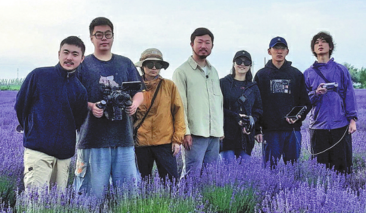
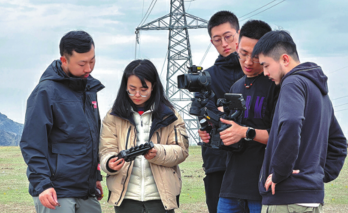
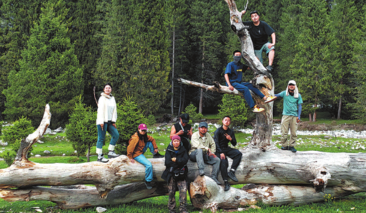

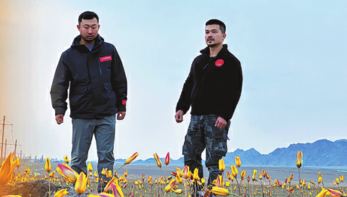
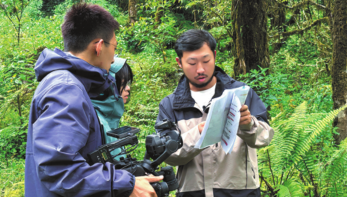

Today's Top News
- Trump threatens 10% tariffs on 8 NATO allies
- PLA monitors US naval vessels transiting the Taiwan Strait
- Visit highlights China's importance
- China fortifies energy security as risks rise
- Taiwan separatists warned of action
- Intl students pledge to be cultural links






























